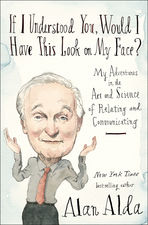[vc_row][vc_column][vc_column_text]
This piece was originally published on Medium.com on Sept. 1, 2017.
“I get you” may be the most powerful three words in the English language next to “I love you.” (“Go fuck yourself” is also a forceful trio but takes the Bronze.) “Getting” someone is the foundation of how we relate to each other. To truly get someone, we must listen to not only what they’re saying but also what they’re not saying. To “hear” what they’re not saying, we must demonstrate empathy and strive to see the world through that person’s perspective. Such an approach may sound simple, but most of our failures to communicate — and thus the basis of so much conflict — stem from not understanding another person’s point of view and not recognizing when they don’t understand ours.
Alan Alda makes this point more articulately than I do in his compelling new book, If I Understood You, Would I Have This Look on My Face?. Drawing from his work as an actor, especially improvisation, and his scientific curiosity, Alda shares his “Adventures in the Art and Science of Relating and Communicating” to great effect. The book is straightforward and well-researched and should be required reading for a country that too often lacks empathy and too often succumbs to perpetual fear of “the other” rather than open ourselves up to each other.
I was drawn to the book after hearing him speak about it on one of the many podcasts I listen to at the gym and think, “I should really buy that book.” Usually I never get around to buying the book or if I do, don’t get around to reading it. But something resonated when I heard Alda, so I read the book this summer. I’ve always admired his acting and his voice, reassuring and suffused with gravitas. But, I must have been sleeping all those years he hosted Scientific American Frontiers on PBS, so I wasn’t aware of his passion for science and communicating it clearly or of the Alan Alda Center for Communicating Science at Stony Brook University. I was, however, quite familiar with the communication (and miscommunication) issues that the book addresses.
I’ve long been fascinated by the way we relate to each other. I talk with and, more importantly, listen to people for a living. Whether leading focus groups or Out of Focus Groups® (an approach to idea-generation and innovation I developed that uses applied improvisation), writing comedy or performing it, it’s imperative that I truly “get” people, sensing whether or not they understand something and adjusting accordingly. What I strive for in work and throughout my life — what I think we all strive for, even if we may not realize it — is to connect genuinely with other human beings.
In everyday interactions — at home, at the office, in our communities — we often want to get our point across so badly, we end up delivering a soliloquy instead of engaging in a conversation. We pay more attention to our own assumptions than the other person’s and fail to read someone else’s face and body language. Even if we do get out of our self-absorbed bubbles and ask questions, they may be disconnected with what the other person was saying or doing because we are not sufficiently dialed into the other person. These failures, Alda observes, are obstacles to good communication.
We must listen with the heart and the head — attend to what the other person is feeling in addition to what they’re thinking. Alda cites the need for “responsive listening,” a foundation of improvisational theatre, where one person responds entirely based on what’s being said and observed rather than what they might have in their head and want to say. In improv, you are “finding your performance in the other person’s eyes.”
Responsive listening is “dynamic” and “contagious” and “allows humanity to reveal itself.” Truly relating to others, Alda says, means “allow[ing] them to have an effect on you.” What a beautiful notion. “Unless I’m willing to be changed by you, I’m probably not really listening,” Alda observes. “But if I do listen — openly, naïvely, and innocently — there’s a chance, possibly the only chance, that a true dialogue and real communication will take place between us.”
It takes courage to allow someone to have an effect on you. You open yourself up to the unknown and the potential for exploitation. But with vulnerability also comes possibility.
What if politicians and business “leaders” who peddle in power and use it overothers recognized the power that comes from this vulnerability, of being open with and to others, allowing themselves to be affected by them, letting them in to their worlds, so that they can appreciate what it’s like to see the world from the perspective of someone without such power. What if more people in power recognized that others are more willing to be led when they feel like they are truly being heard, and when actions actually respond to their needs and concerns.
Alda addressed us attendees via Skype at the Applied Improvisation Network worldwide conference in Irvine, Calif., last weekend. He highlighted key themes in his book in his charming yet grounded way. (Resuming the conversation after a buffering problem, he quipped, “What was the last great thing I said?”) He underscored the importance of applying the principles of improvisation to strengthen communication in all aspects of our lives, and he urged us to use our “improvisational spirit to reach into the dark and pull out the answer.”
I get you, Mr. Alda. I hope we all do…
[/vc_column_text][/vc_column][/vc_row]
